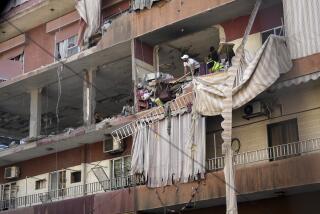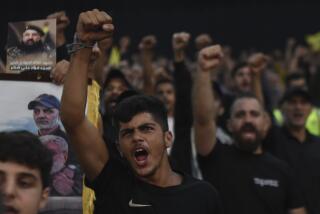COLUMN ONE : U.S. Stakes Hopes on Quick End : If Hussein can hold out for even a few days, analysts say, he could establish himself as a leader of the Arab world even if the price is a fearful mauling for his country.
WASHINGTON — Beyond the immediate military goals of the punishing pre-dawn air attack on Baghdad and the wave after wave of raids to follow, President Bush hopes to sting President Saddam Hussein into reconsidering his adamant refusal to relinquish Kuwait.
And, senior U.S. officials made clear, their war plan was also designed to assure that--if Hussein should capitulate soon--his nuclear and chemical weapons facilities and other offensive capabilities would already have been crippled or destroyed.
For the U.S. strategy of battering Hussein into submission to succeed, however, many analysts believe it must succeed very quickly.
If Hussein can hold out against the massive firepower arrayed against him for even a few days, in this view, he could establish himself as a leader of the Arab world even if the price is a fearful mauling for his people and his country.
And a Saddam Hussein transformed into popular hero among the Arab masses could become a long-term nightmare for Washington and its Arab allies even if they ultimately prevail on the battlefield. Indeed, some Administration officials believe something close to that is Hussein’s current strategy: to ride out the initial attack, proving his courage and showing the Arab world and others that he cannot be intimidated. Afterward, he could offer to negotiate peace terms.
The longer Hussein can hold out, the more effective his strategy would become.
“If it’s a quick war, if we are able to strengthen Saudi Arabia and Egypt, and if we get rid of Saddam, and if we come with some imaginative diplomacy on the Palestinian issue, then we could come out ahead in the region and the world,” said Geoffrey Kemp, a National Security Council expert on the Middle East during the Reagan Administration.
“If it’s a long war with an inconclusive end, then we’re in trouble and probably will be forced to evacuate the Mideast at some point,” he said.
Arab leaders have turned military defeat into political victory before. Palestine Liberation Organization Chairman Yasser Arafat enhanced his political standing in the Arab world by standing up to the Israeli assault in Lebanon even though he was badly pummeled militarily. A generation before, Egyptian President Gamal Abdel Nasser lost the Sinai Peninsula and the Gaza Strip to Israeli forces in the October, 1967, war but his political reputation grew as a result.
To defeat such a strategy of gaining from defeat, the United States and its allies must inflict such punishment that Hussein will decide he must abandon this approach and capitulate almost at once.
“Is there any hope that he will capitulate?” asked Phebe Marr, Iraq specialist at the National Defense University. “He’s hoping to wait until a ground war,” when his massive numbers of tanks might land a significant counterpunch.
“He thought he could sit out an air war and wait to weaken us and the coalition on the ground. That was his assumption, but he may not be able to survive until a ground war,” Marr said.
Ken Katzman, former gulf analyst for the CIA, said early information from the region after the first waves of the air assault suggests that Hussein may in fact be feeling that pressure.
“The fact that Iraq hasn’t gotten a Scud (missile) or an aircraft off the ground indicates that Baghdad is in pretty bad shape,” Katzman said.
That is critical for Washington’s Arab allies. If Hussein is not killed or humiliated in the war, he could emerge from the conflict as a dangerous and vindictive foe for the leaders of Saudi Arabia, Egypt and Syria.
Hussein’s defiance of the United States and the West seems to have played well with the Arab masses even though it was rejected by many Arab leaders. If Hussein survives, he could foment revolution across the Arab world, even if his army is mauled.
“Saddam will move from bunker to bunker and try to get on television,” said Kemp, now a senior associate of the Carnegie Endowment for International Peace. “I find it difficult to imagine this man will surrender. I think his priority now is to stay alive and hope that he can surface in the future and say, ‘I lived through it.’ ”
Augustus Richard Norton, senior fellow at the International Peace Academy in New York, said: “Saddam will have sampled in a period of hours more devastation and more accurate military attacks on strategic targets than Iran was able to mount during the entire span of the eight-year gulf war.
“This is a time for Saddam to reflect, to consider whether he really understands the immensity of the military forces arrayed against him,” Norton said. “The whole thing continues until he says uncle. I predict that Saddam is going to sit there enraptured by the violence with the word uncle on his lips but unable to say it because Saddam’s honor and future are at stake. A quick capitulation would not constitute a noble victory that would ensure his political life.”
But William B. Quandt, a National Security Council expert on the Middle East during the Carter Administration, said the West has found it difficult to predict Hussein’s response.
More to Read
Sign up for Essential California
The most important California stories and recommendations in your inbox every morning.
You may occasionally receive promotional content from the Los Angeles Times.









